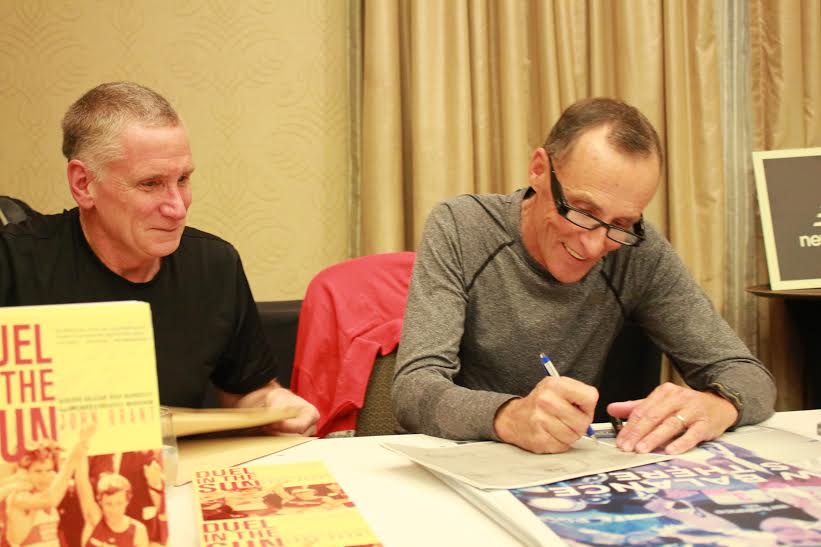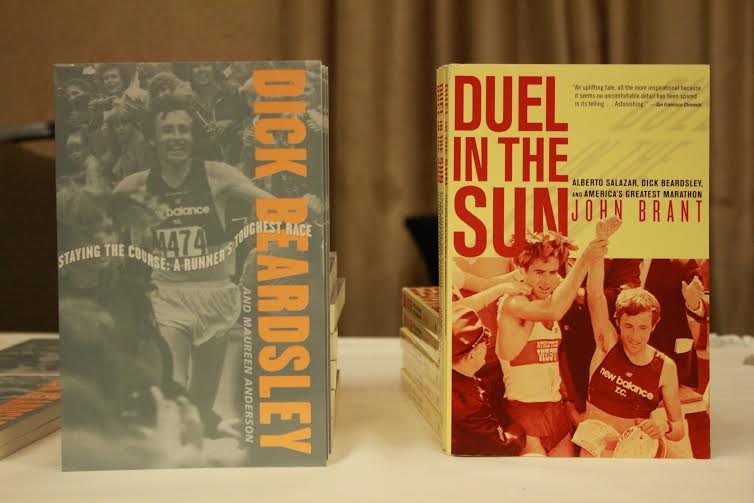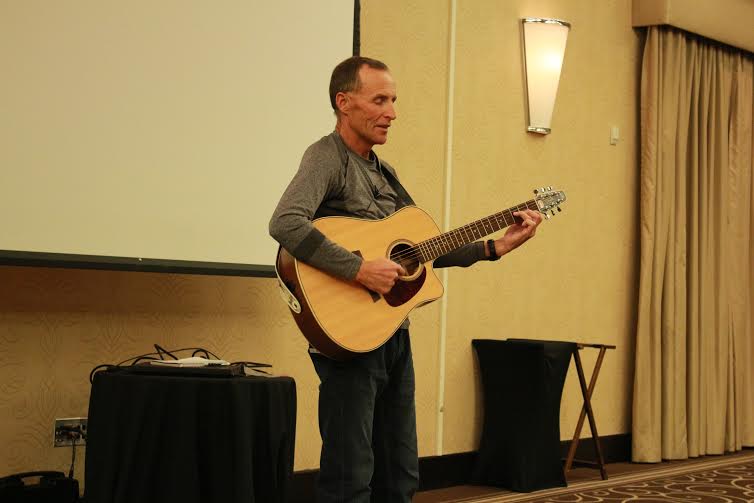Life Lessons from one of America’s greatest runners: Dick Beardsley

As the season changes from fall to winter, runners could take the advice of great American runner Dick Beardsley. In his keynote speech at the Canadian university cross-country championships, he explains all that he’s learned from his running career– from the moments of glory to the dark days of drug addiction.
Story by Nathan Monk
On the eve of the 2015 Canadian university cross-country championships, I sit in an empty conference room in Guelph, Ont. There is a guitar laying on the floor in front of me and off to the side is a small autograph table with books and posters. I’m here for a keynote brought to us by The Running Works, Guelph and New Balance Canada. Little do I know that in 30 minutes the room will fill, and I will hear one of the most moving keynotes from one of the most selfless champions in sport.
Duel in the Sun
The room fills with university track athletes, parents with kids, Canadian running elites like Eric Gillis and Ried Coolsaet, and legends like Joy and Walt Kramarich. The lights go dim and the keynote session starts with the iconic four-minute clip of what is now known as ‘Duel in the Sun,’ the finish of the 1982 Boston Marathon. The clip shows Dick Beardsley, known then as ‘the country bumpkin from Minnesota’ and the iconic favourite at the time, Alberto Salazar. The two are dueling it out from Heartbreak Hill to the finish line with only two arms lengths separating them. It was the first time two American male runners finished a marathon sub-2:10 (Dick Beardsley: 2:08:53) in the same race. Dick Beardsley lost by 1.6 seconds to Alberto Salazar. Both champions would never run that fast again. The lights come back on.
Enter Dick Beardsley
Beardsley bounds to the front of the room and says: “I’ve seen that clip thousands of times and it still makes the hair on the back of my neck turn.” He has a broad white smile, the hollow face of a runner and reminder notes written on the palm of his hand. His skin shows the years of wisdom of someone who has been to hell and back. He looks relaxed in his jeans, New Balance runners and technical long-sleeved shirt. He innocently miss-pronounces Guelph, exaggerating ‘Guel-up’ which endears him to the audience.
He takes us back to his high school days starting in 1973 when after being rejected by the football team, he decided to try out for track. He talks about having to walk the last mile of his workout, a 3.2 miler where he arrived dead last. A year later, he would be running that same workout, this time being in the lead. This is where, in his talk, he imparts the first of his many life lessons:
‘Do the work and don’t ever give up on yourself.’
Beardsley graduated high school becoming the first of this family to do so. For the first time, he saw his dad cry. As a gift, his parents gave him round-trip airfare to the Boston Marathon, clearly seeing the potential in their son.
Pavo Nurmi Marathon
In his talk, Beardsley jumps to 1977 when he ran his first marathon– the Pavo Nurmi Marathon, an annual race held each August in Iron County, Wisconsin. Still an amateur, he ran it without taking any fluids and having fasted for five days prior to the event. Beardsley had read somewhere that fasting was the thing to do (bad advice). Not only that, he also ran in brand new running shoes (named: Nike ‘waffle’ trainers at the time). Seasoned runners would know these were mall big ‘no-no’s.’ Beardsley describes how cocky he was during the race. He remembers saying to himself ‘I’ve made it,’ even after seeing blue spray-paint with the words ‘you have hit the wall’ at mile 20. He barely finished crossing the line completely dehydrated, with serious blood blisters, and having hit the wall with only 200 meters to go. That led to another life lesson in running:
‘Never say you’ve ‘made it’ until you cross the finish line.’
The 1982 Boston Marathon
Beardsley remembers that day clearly. He was shielded from the crowds and carnival-like atmosphere by his coach, Bill Squires. He woke up early that morning hoping to be greeted with a nice tailwind, overcast sky, and cool temperatures. Instead, he opened the blinds to find a 20C day and Willard Scott’s voice blaring from the T.V. “It’s going to be a great day for the marathon in Boston, sunshine and 68 degrees.” Beardsley remembers thinking to himself: ‘This guy has clearly never run a marathon before.’
When he lined up, on his left was Alberto Salazar (who later came to resent him) and to the right was Boston’s poster child, Bill Rogers. He got emotional thinking of all the greats who went before him, including Jonny Kelly. The gun went off and he along with the front runners went through the first mile in a blistering 4:33 pace, slowing to an average of 5 to 5:05 by the end of the race. Beardsley remembers thinking about how nervous he was and how he had felt sick in the first two miles. By the end of mile three, he wanted to drop out. The term DNF didn’t exist back then. He told himself, ‘just keep going, I’ll get through it.’ And, he did. Now, he speaks of the importance of relying on the mind when running gets tough– another of the lessons he draws attention to:
“The one thing we have is what the good Lord gave us, the brain.”
Beardsley made it to the famous rolling hills between miles 21 and 26 ending with Heartbreak Hill. His coach had said: “If you make it to the hill, I want you to run as hard as you can to get ahead of the pack. If you can’t, do it on the backend.” At this point, Beardsley was pushing himself with only two arms lengths between him and Salazar. They had separated from the front pack. He thought about how his parents giving him the roundtrip airfare to Boston as a graduation gift, and how he was the under-dog and had made it this far. At the 25.2 mile marker, he looked down to see the famous blue spray paint: ‘1 mile to go’. Tears streamed down his face. At the same time, he got a knot in his leg. Salazar passed him. The knot eased up allowing him to give his famous kick at the end of the race. He remembers how much it hurt. He parts with us his next life lesson:
“No matter how much it hurts, never, ever, ever give up.”
Tragedy and Discovery
Beardsley ended competitive running in 1988 to return to the simple farming life. He had a remarkable journey qualifying twice for the 1984 and 1988 Olympics, winning the first London Marathon with a time of 2:11:48 in 1981. He is the course record holder for the Napa Valley Marathon having run 2:16:20 in 1987.
Though having had a greatly successful running career, Beardsley’s life is not without tragedy. A combination of horrific car accident and hiking accidents that followed his running days left him addicted to Valium, Percocet and Demerol. At it’s height, his drug addiction saw him taking 80 to 90 pills a day. It wasn’t until he got caught stealing the drugs, that he was able to start changing.
He will have been clean 19 years this coming February. He says his faith got him get through this horrible chapter. Most of this story has been told before, in various shapes and forms but the audience was not prepared for what happened next.
His Greatest Run
All the while Beardsley speaks, the guitar lay in its case at the front of the room. Then, he says “The greatest run I ever had was not actually Boston ’82. It was with my son, Andy, a few years ago.” Andy was the boy he and his wife, Jill, adopted who they raised to be a respectable man. The run happened in Miles City, Montana. Beardsley had went to meet up with his son and when he arrived, his son was in shorts with his runners and said “Pop, let’s knock out a couple.” The two ran for two miles. To Beardsley’s surprise, Andy tackled the hill and took off at the end of mile one, causing him to run as hard as he could to catch up. At this point in Beardsley’s presentation, he pauses and says, with his voice cracking, “I buried my son 5 weeks ago.”
A few gasps come from the audience. He goes on to say how important that run was, how much it meant him, and how important it is to tell the ones we love, that we love them. The keynote ends with a beautiful acoustic tribute by Beardsley to his son. He picks up the guitar from the front of the room. He starts the song softly. As this great American runners sings, one line stamds out: “The greatest run I had was running with my lad.”



